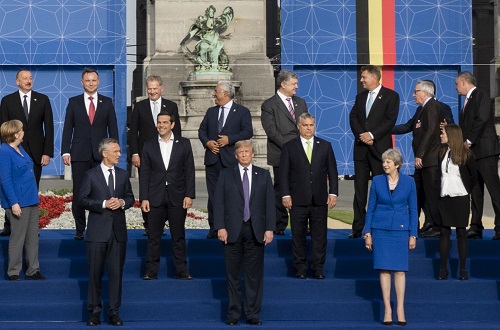
Donald Trump has just left Brussels after a two-day NATO summit after he raised two key issues. Here’s what you need to know.
What were the main two key issues raised at the NATO summit?
President Trump objected to Germany’s agreement to build an energy pipeline with Russia, and he repeated his insistence that member nations spend at least two percent of GDP on national defense.
Why did he say Germany is “controlled by Russia”?
Donald Trump opened the summit by saying that “Germany is totally controlled by Russia.” He added, “Germany is a captive of Russia. I think it’s something that NATO has to look at.” German Chancellor Angela Merkel, who grew up in East Germany before the fall of the Berlin Wall, replied that she had “experienced myself how a part of Germany was controlled by the Soviet Union.”
His remarks stem from the fact that Germany imports a majority of its natural gas from Russia, a percentage that will only increase with the building of the Nord Stream 2.
What is the Nord Stream 2?
The Nord Stream 2 is an $11 billion pipeline that will provide Germany with natural gas supplied by the Russian company Gazprom. The NS2 will run under the Baltic Sea, from Russia to Germany – rather than utilizing the current energy pipeline that weaves underground through Ukraine, Belarus, and Poland.
Why does NS2 matter?
Eastern European nations fear NS2 will give Russia the strategic leverage to cut off the region’s energy supply, as it did to Ukraine this year, as well as in 2006, 2008, and 2014. The NATO Declaration that members signed this week addresses the issue by saying, “We believe it is essential to ensure that the members of the Alliance are not vulnerable to political or coercive manipulation of energy, which constitutes a potential threat.”
Can U.S. economic policy affect this situation?
Thanks to higher yields from a lighter regulatory regime in Washington, the U.S. is exporting natural gas to Europe at near-record levels.
What proposals did President Trump make concerning military spending?
NATO members agreed in 2014 to spend two percent of their GDP on national defense; however, they have until 2024 to meet that obligation. President Trump would like to see that deadline moved up and the total amount doubled.
“During the president’s remarks today at the NATO summit, he suggested that countries not only meet their commitment of two percent of their GDP on defense spending, but that they increase it to four percent,” said White House spokesperson Sarah Huckabee Sanders.
What is the current state of NATO military spending?
Only six of its 29 members currently meet this obligation: the U.S., the UK, Greece, Estonia, Latvia, and Poland spend at least two percent of GDP on defense, according to NATO figures.
On the other hand, Germany currently spends 1.24 percent of GDP on defense and announced in May that it intends to boost this only to 1.5 percent by 2025.
This infographic presents the figures for each nation.
Trump has been critical of America’s lopsided NATO contributions for more than 30 years. In all, the U.S. provides approximately two-thirds of all NATO funding. The U.S. decreased its spending to 3.5 percent of GDP this fiscal year.
Have other people suggested, or opposed, spending four percent of GDP on national defense? What were their arguments?
The Heritage Foundation advanced the idea in its 2007 report, “Four Percent for Freedom,” written by James J. Carafano, Baker Spring, and Mackenzie Eaglen. It has subsequently been promoted by various politicians, including John McCain and Mitt Romney.
“Measuring defense spending as a percentage of GDP is the most appropriate and realistic means to gauge America’s commitment to ensuring an adequate national defense,” Ed Feulner summarized in the report’s foreword. “Without maintaining annual defense budgets at 4 percent of GDP America’s military will become a ‘hollow’ force placing the lives of our young men and women in uniform at risk and jeopardizing the Pentagon’s ability to defend the nation’s vital national interests.”
The National Taxpayers Union Foundation opposed the plan in its report titled, “When ‘More’ is Meaningless.”
“A growing economy should allow Americans to keep more of the wealth they produce,” wrote its lead author, Matthew Fay. “Perpetually increasing the defense budget is unlikely to improve U.S. military readiness because it fails to address how defense spending is allocated or the organizational prerogatives of the military services.”
Does U.S. military spending affect European economic policy?
Some critics say that allowing the United States to provide Western Europe’s defense allows those governments to channel more funds into social welfare policies. “Freed from the obligation to spend on defense, the one core function expected of any government, European governments have chosen to divert their resources into” maintaining “bloated welfare states,” writes Christopher Preble of the Cato Institute.
But others say that’s beside the point. “It is true that the presence of U.S. forces in Europe contributes to the collective defense of European allies,” wrote Luke Coffey of the Heritage Foundation, but in his view the policy serves American interests by providing soldiers “geographical proximity to some of the most dangerous and contested regions in the world.”
(Photo credit: President of Ukraine. This photo has been cropped. CC BY 4.0.)

